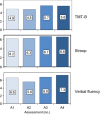Hippocampal volume in relation to clinical and cognitive outcome after electroconvulsive therapy in depression
- PMID: 23745780
- PMCID: PMC4226425
- DOI: 10.1111/acps.12150
Hippocampal volume in relation to clinical and cognitive outcome after electroconvulsive therapy in depression
Abstract
Objective: In a previous magnetic resonance imaging (MRI) study, we found a significant increase in hippocampal volume immediately after electroconvulsive therapy (ECT) in patients with depression. The aim of this study was to evaluate hippocampal volume up to 1 year after ECT and investigate its possible relation to clinical and cognitive outcome.
Method: Clinical and cognitive outcome in 12 in-patients with depression receiving antidepressive pharmacological treatment referred for ECT were investigated with the Montgomery-Asberg Depression Rating Scale (MADRS) and a broad neuropsychological test battery within 1 week before and after ECT. The assessments were repeated 6 and 12 months after baseline in 10 and seven of these patients, respectively. Hippocampal volumes were measured on all four occasions with 3 Tesla MRI.
Results: Hippocampal volume returned to baseline during the follow-up period of 6 months. Neither the significant antidepressant effect nor the significant transient decrease in executive and verbal episodic memory tests after ECT could be related to changes in hippocampal volume. No persistent cognitive side effects were observed 1 year after ECT.
Conclusion: The immediate increase in hippocampal volume after ECT is reversible and is not related to clinical or cognitive outcome.
Keywords: cognition; depression; electroconvulsive therapy; hippocampus; longitudinal; magnetic resonance imaging.
© 2013 The Authors. Acta Psychiatrica Scandinavica published by John Wiley & Sons Ltd.
Figures





References
-
- Pittinger C, Duman RS. Stress, depression, and neuroplasticity: a convergence of mechanisms. Neuropsychopharmacology. 2008;33:88–109. - PubMed
-
- Mac Queen G, Frodl T. The hippocampus in major depression: evidence for the convergence of the bench and bedside in psychiatric research? Mol Psychiatry. 2011;16:252–264. - PubMed
-
- Lucassen PJ, Heine VM, Muller MB, et al. Stress, depression and hippocampal apoptosis. CNS Neurol Disord Drug Targets. 2006;5:531–546. - PubMed
Publication types
MeSH terms
LinkOut - more resources
Full Text Sources
Other Literature Sources
Medical

